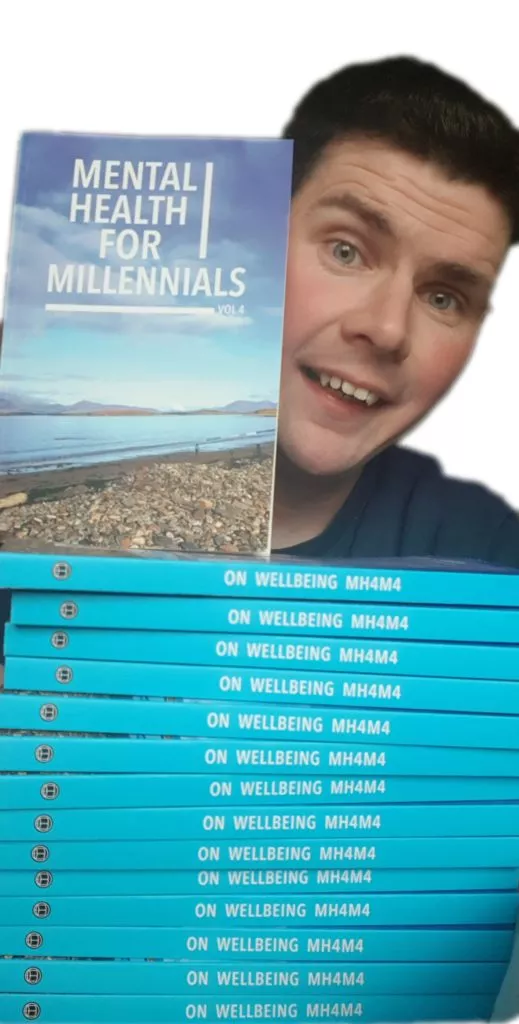Galway man Chris Sherlock is a broadcaster with Flirt FM but another important role he plays is raising awareness around bullying.
While he is enjoying his life and career now, Mr Sherlock had to overcome depression and anxiety brought on by severe bullying he suffered in secondary school.
After suffering horrendous psychological and physical abuse in first year, Mr Sherlock left school and was too traumatised to return.
Having recently shared his story in a chapter of the latest Mental Health For Millennials book, Mr Sherlock spoke to BreakingNews.ie about his experiences with bullying and why he feels it is more important than ever for people to share personal stories.
Mr Sherlock was naturally shy and soon became the target of taunts and name-calling when he started secondary school in 2004.
“Rather than reacting, I would say nothing, I would walk past them.”
Things soon worsened and he suffered physical assaults.
“Because I was in the early stages of settling into school I would ring home and check in with my mother to let her know how things were going.
“As I was on the phone to her at break one day, two lads from the group came up behind me, caught me and pushed me against a wall, took my phone, and flung it away. They started choking me, and mocking me, demanding any money I had.
“I was trying to squirm out of it, it was probably only a minute or so but it felt like a lot longer, I eventually tried to push my way out and escaped. I didn’t want to fight, so I just ran to a quiet part of the school and sat there in shock. I had to ring my mum and I just told her I dropped the phone and had to go and get it, I was trying to make up an excuse in the moment, my parents didn’t suspect anything at the time.”

A few days later, Mr Sherlock was pushed down the stairs in an incident that would have a lasting impact on his life.
“It was coming towards lunchtime, and we had a class up in the school’s main building.
“I was going up to the fifth floor and at the top of the stairs there were double doors. There were three people there and two were calling me names, one of them locked the door and I just said ‘I need to get to class’.
“They pushed me against the wall, took my bag, pulled my polo shirt off my head and pushed me down the stairs, there were eight to ten steps before a platform.
“From my wrist down my forearm I was pumping with blood, and I was in hysterics at this point. When I got up I remember looking up at them laughing, and then I ran down to the school office to get away from them. When I got there a nurse happened to come in. She bandaged me up and said ‘you’re very lucky, what happened?’
“I just told her I tripped and fell down the stairs. I was afraid to say anything in case the bullying got worse.”
Afraid to speak out
Mr Sherlock was terrified to tell anyone what had happened for fear of being labelled a “rat” and suffering worse bullying.
He feels this is still a problem among younger people suffering bullying.
“I was worried about causing trouble for my parents and that they’d be disappointed in me.
“I took time off, but I was terrified of going back to school. When I got to the building it was like it all came flooding back to me, I could remember every detail of being pushed down the stairs and I could remember looking at their faces laughing. I was afraid they would be thinking, ‘he’s going to tell on us now that he’s back’, every possible scenario was going through my head.
“I was hysterical when we got to the gates, I said, ‘I can’t go to school any more’, and my mother was just looking at me in shock asking what’s wrong.”
Mr Sherlock then returned home and told his parents what had happened, they were supportive but told him they wished he had come to them sooner.
“I was afraid they would be angry with me, obviously they weren’t, and it started the ball rolling in the sense of talking to the school and reporting it to them. I thought, ‘this is going to be bad now’, I refused point-blank to go back to school.
“I was sent to see a child psychologist. After a couple of weeks they were trying to get me back to school again, I couldn’t do it, it was decided that I would get home tuition. This was only for a certain time, first year, and that I would be introduced back slowly in second year, that was the plan.”
Two of the bullies involved received a week of detention and were suspended for just two days despite the impact of their actions on Mr Sherlock.
“The principal said, look it’s the consequences of being a first year student it’s a ritual to be part of a first year beating. My dad heard that and said ‘what kind of school are you running? That is the most absurd thing’.
“He said even if you want to go back you can pick another school, but I was afraid it would happen again.”
Mr Sherlock hit a low point after this, leading to him considering suicide.
“With all this in the background, I’d just had enough of it, I said I didn’t want to be a burden on anyone and I went off walking, I was encouraged to walk and listen to music when I was feeling bad.
“I did one day, and I ended up at the Galway Canal which isn’t far from where I live. I’m not able to swim, and I was moments away from jumping in and ending it all because I couldn’t cope with the pressure of the school, the system, and I didn’t want to be disappointing my parents, I thought ‘I’d be better off gone at least there’s no more worrying about me or me worrying about what my life is going to be like’.
“These were the thoughts going through my head in a loop. Just by a stroke of luck two of my friends were coming home from town, and they saw me. They didn’t even ask what I was doing, they just said ‘we’re heading back to our house, do you fancy joining us and playing some PlayStation?’
“It was that momentary distraction, an act of kindness, I went back, and I never looked at going back down the road of suicide again. I just thought there is kindness out there.”
Trust issues
Mr Sherlock was suffering with severe anxiety and depression but at such a young age it was hard to process these emotions, and it took him a further two years to be able to trust people.
“I knew I should have been in school and part of me wanted to go back, I realised I needed to have a good education behind me to achieve things in life. There was no pressure, but I knew I needed it.
“It got to the stage where I couldn’t be around groups, if it was even three or four people I’d be frantic because I’d be afraid that one of them would just turn on me and start harassing me out of nowhere
“I just stuck with the friends from around my area and I relied on them.”
Mr Sherlock's parents did not push him to return to school, but he was recommended to the Galway City Partnership.
The community programme placed him with an older mentor who encouraged him to pursue activities he enjoyed, such as photography and music.
“The people down at the community centre would have a coffee morning or something like that, and I was asked to take photographs.
“At first I was reluctant because I knew I was going to be around a lot of people, but I also knew it would be a lot of adults, so I slowly took on things like that, and I eventually found trust in people.
“From there I just jumped into other things, my parents encouraged me and let me know they would help, and they guided me too, I wasn’t allowed to sit in my room all day and watch TV or whatever.
“It was a house where the radio was always on, and I thought, the stories people have to tell really are incredible. I would listen to anything and everything and I loved music so doing something with music was the dream.”
Six years ago Mr Sherlock saw an advert to volunteer at his local college's radio station, and he has been working as a broadcaster ever since.
“I hope to continue working with broadcasting and maybe even television,” he said.
If it helps somebody who reads or listens to reach out for help and come out of the other side of it as I did... it’s all worth it.
Mr Sherlock's message to anyone experiencing bullying is that reaching out when they are ready is the most important step, and that things do improve.
Despite not being able to see a way past the situation he was in, he is now working in what he describes as his “dream job”.
He now wants to share his story to help others and this was what led to his involvement in the Mental Health For Millennials book.
“It’s good to get it out there and think if somebody is listening to me or reading about my story it raises awareness that bullying needs to be talked about.
“If it helps somebody who reads or listens to reach out for help and come out of the other side of it as I did... it’s all worth it.”
In some ways sharing his story has seen things come full circle for Mr Sherlock as he has recently been invited to do talks on bullying at secondary schools.
School talks
One session, conducted via Zoom at a Galway school, even helped to resolve an issue involving students who had been exchanging nasty comments online.
“The teacher said to me with the pandemic going on there were a lot of pupils feeling isolated because they were away from their friends.
“People were being bullied on TikTok and all these people were in the same year. I was brought on to tell my story, it was over Zoom, but I could hear their reactions, I didn’t leave anything out.
“The teacher told me afterwards that there were three people in the group hassling each other, rather than a one-way thing, and I put out the message to be kind.
“I was told two or three days later they had stopped the bickering and fighting on social media. Even if I never hear any more feedback that alone was great to hear.”
He praised new procedures schools have brought in for bullying since his time in school, including anonymous comment boxes, but Mr Sherlock feels talking is the most effective measure of resolving issues and this is why he continues to share his own story.

“I’m pleased to say I’ve moved on from it now. I go to concerts, I talk to people from all walks of life through the radio, I’m always keen to hear their stories.
“People telling personal stories is key, you can give statistics all you want, but it’s really about listening to people. Talking to the school was a great thing because that’s where it can all start for people like me.
“People do come around, but sometimes it takes time like it did for me. Speaking up, talking to a parent, a sibling, an aunt, an uncle. Whoever you can bounce off and talk to, it’s the best thing you can do to confide in someone.”
If you have been affected by any of the issues raised in this article, you can freephone the Samaritans 24 hours a day for confidential support at 116 123 or email jo@samaritans.org.
You can also freephone the national Bereavement Support Line run by the HSE and Irish Hospice Foundation at 1800 80 70 77 (Monday-Friday 10am-1pm), and the contact information for a range of mental health supports is available at mentalhealthireland.ie/get-support/.
In the case of an emergency, or if you or someone you know is at risk of suicide or self-harm, dial 999/112.







